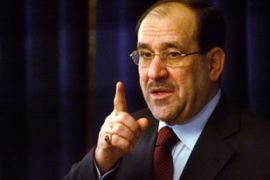Maliki rejects Sunni resignations
Iraqi prime minister to hold crisis summit this week to hear Sunni concerns.

Several other mortar bombs landed at another petrol station in a nearby district, wounding six people.
Last Wednesday suicide bombers attacked two petrol stations , killing 70 people.
‘Samarra plotter killed’
Meanwhile, the US military said it had killed the man behind the attack on the Samarra mosque in June.
A military spokeswoman said: “He is also the terrorist mastermind responsible for the Golden Mosque bombing in Samarra on June 13. Al-Badri was positively identified by close associates and family members.”
Major-General Abdel Karim Khalaf, interior ministry operations director, said that al-Badri was the head of the cell that carried out the February 2006 attack on the mosque, widely seen as the trigger for numerous sectarian revenge killings in Iraq.
Last week, more than 1,000 Iraqi troops backed by US paratroopers launched an operation to expel al-Qaeda’s Iraqi affiliate from Samarra, where the group have been accused of two separate attacks on the shrine.